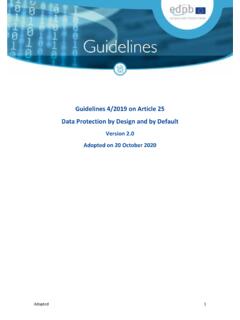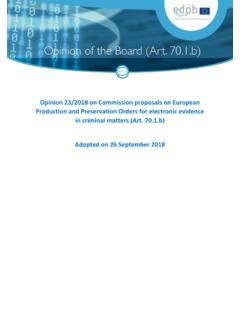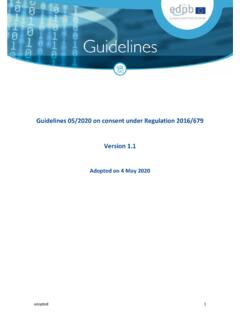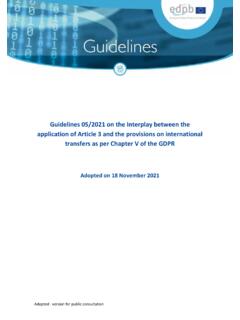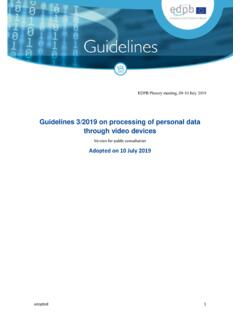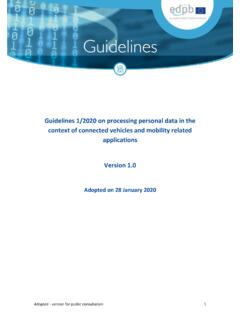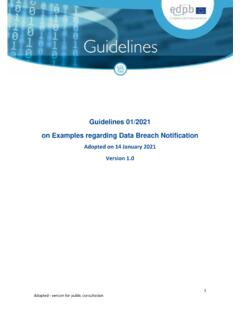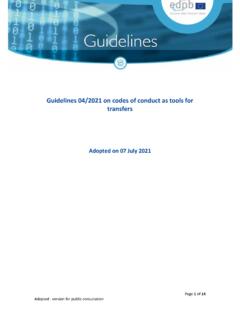Transcription of Guidelines 2/2019 on the processing of personal ... - Europa
1 1 AdoptedGuidelines2/2019onthe processing of personal data underArticle 6(1)(b) GDPR in the context of the provision of onlineservices to data subjectsVersion October20192 AdoptedVersion historyVersion October 2019 Adoption of the Guidelines after public consultationVersion April 2019 Adoption of the Guidelines for publication consultation3 Adopted1 Part 1 of 2-Analysis of Article 6(1)(b).. of Article 6(1)(b) with other lawful bases for of Article 6(1)(b).. for performance of a contract with the data of for taking steps prior to entering into a 3 Applicability of Article 6(1)(b) in specific for service improvement .. for fraud prevention .. for online behavioural for personalisation of European Data protection BoardHaving regard to Article 70(1)eof Regulation 2016/679/EU of the European Parliament and of theCouncil of 27 April 2016 on the protection of natural persons with regard to the processing of personaldata and on the free movement of such data, and repealing Directive 95/46/EC,HAS ADOPTED THE FOLLOWING GUIDELINES1 PART 1 to Article 8 of the Charter of Fundamental Rights of the European Union, personal data mustbe processed fairly for specified purposes and on the basis ofalegitimate basis laid downby law.
2 Inthis regard, Article 6(1) of the General Data protection Regulation1(GDPR) specifies that processingshall be lawful only on the basis of one of six specified conditions set out in Article 6(1)(a) to (f).Identifying the appropriate legal basisthat corresponds to the objective and essence of the processingis of essential importance. Controllers must,inter alia,take into account the impact on data subjects rights when identifying the appropriate lawful basisin order torespect the principleof 6(1)(b) GDPR provides a lawful basis for the processing of personal data to the extent that processing is necessary for the performance of a contract to which the data subject is party or in orderto take steps at the request ofthe data subject prior to entering into a contract .2 This supports thefreedom to conduct a business, which is guaranteed by Article 16 of the Charter, and reflects the factthat sometimes the contractual obligations towards the data subject cannot be performed without thedata subject providing certain personal data.
3 If the specific processing is part and parcel of delivery ofthe requested service, it is in the interests of both parties to process that data, as otherwise the servicecould not be providedand the contract could not be performed. However, the ability to rely on this orone of the other legal bases mentioned inArticle6(1) does not exempt the controller from compliancewith the other requirements of the 56 and 57 of the Treaty on the Functioning of the European Union define and regulate thefreedom to provide services within the European Union. Specific EU legislative measures have beenadopted in respect of information society services .3 These services are defined as any servicenormally provided for remuneration, at a distance, by electronic means and at the individual requestof a recipient of services. This definition extends to services that are not paid for directly by thepersons who receive them,4such as online services funded through advertising.
4 Online services asused in these Guidelines refers to information society services .1 Regulation (EU) 2016/679 of the European Parliament and of the Council of 27 April 2016 on the protection of natural personswith regard to the processing of personal data and on the free movement of such data, and repealing Directive 95/46/EC (GeneralData protection Regulation).2 See also recital for example Directive (EU) 2015/1535 of the European Parliament and of the Council, and Article 8 Recital 18 of Directive 2000/31/EC of the European Parliament and of the Council of 8 June2000 on certain legal aspects ofinformation society services, in particular electronic commerce, in the Internal development of EU law reflects the central importance of online services in modern society. Theproliferation of always-on mobileinternet and the widespread availability of connected devices haveenabled the development of online services in fields such as social media, e-commerce, internetsearch, communication, and travel.
5 While some of these services are funded by user payments,othersare provided without monetary payment by the consumer, instead financed by the sale of onlineadvertising services allowing for targeting of data subjects. Tracking of user behaviour for the purposesof such advertising is often carried out in waysthe useris oftennot aware of,5and it may not beimmediately obvious from the nature of the service provided, which makes it almost impossible inpractice for the data subject to exercisean informed choiceover the use of their thisbackground, the European Data protection Board6(EDPB) considers it appropriate toprovide guidance on theapplicability of Article 6(1)(b)toprocessingofpersonal data in the context ofonline services, in order to ensure that this lawful basis is onlyrelied upon where Article 29 Working Party (WP29) has previously expressed views on the contractual necessity basisunder Directive 95/46/EC in its opiniononthe notion of legitimate interests of the data , that guidance remains relevant to Article 6(1)(b) and the of these Guidelines are concerned with the applicability of Article 6(1)(b)
6 To processing of personal datain the context of contracts for online services, irrespective of howthe services are financed. Theguidelines will outline the elements of lawful processing under Article 6(1)(b) GDPR and consider theconcept of necessity as it applies to necessary for the performance of a contract . protection rules govern important aspects of how online services interact with their users,however, other rules apply as well. Regulation of online services involves cross-functionalresponsibilities in the fields of,inter alia,consumer protection law, and competition regarding these fields of law are beyond the scope of these Article 6(1)(b) can only apply in a contractual context, these Guidelines do not express a viewon the validity of contracts for online services generally, as this is outside the competence of the , contracts and contractual terms must comply with the requirements of contract lawsand, as the case may be for consumer contracts, consumer protection laws in order for processingbased on those terms to be considered fair and general observations on data protection principles are included below, but not all dataprotection issues that may arise when processing under Article 6(1)(b)
7 Will be elaborated must always ensure that they comply with the data protection principles set out in Article5 and all other requirements of the GDPR and, where applicable, the ePrivacy 2-ANALYSIS OF ARTICLE6(1)(B) observations5In this regard, controllers need tofulfilthe transparency obligations set out in the under Article68 29 Working Party Opinion 06/2014 on the notion of legitimate interests of the data controller under Article 7 of Directive95/46/EC (WP217). See in particular pages 11, 16, 17, 18 and lawful basis for processing on the basis of Article 6(1)(b) needs tobe considered in the context ofthe GDPR as a whole, the objectives set out in Article 1, and alongside controllers duty to processpersonal data in compliance with the data protection principles pursuant to Article 5. This includesprocessing personal data in a fair and transparent manner and in line with the purpose limitation anddata minimisation 5(1)(a) GDPR provides that personal data must be processed lawfully, fairly and transparentlyin relation to the data subject.
8 The principle of fairness includes, inter alia,recognising the reasonableexpectations8of thedata subjects, consideringpossible adverse consequences processing may haveon them, and having regardto the relationship and potential effects of imbalance between them andthe mentioned, as a matter of lawfulness, contracts for online services must be valid under theapplicable contract example of a relevant factoris whether the data subject is a child. In sucha case (and aside from complyingwith the requirements of the GDPR, including the specificprotections which apply to children),9the controller must ensure that it complies with the relevantnational laws on the capacity of children to enter into , to ensure compliancewith the fairness and lawfulness principles, the controller needs to satisfy other legal example, forconsumer contracts, Directive 93/13/EEC on unfair terms in consumer contracts (the Unfair Contract Terms Directive ) may be 6(1)(b) is not limited to contractsgoverned by the law of an EEA member 5(1)(b) of the GDPR provides for the purpose limitation principle, which requires that personaldata must be collected for specified, explicit, and legitimate purposes and not further processed in amanner that is incompatible with those 5(1)(c) provides for data minimisation as a principle, processing as little data as possible inorder to achieve the purpose.
9 This assessment complements the necessity assessments pursuant toArticle 6(1)(b) to (f). purpose limitation and data minimisation principles are particularly relevant in contracts foronline services, which typically are not negotiated onan individual basis. Technological advancementsmake it possible for controllers to easily collect and process more personal data than ever before. Asa result, there is an acute risk that data controllers may seek to include general processing terms incontracts in order to maximise the possible collection and uses of data, without adequately specifyingthose purposes or considering data minimisation obligations. WP29 has previously stated:The purpose of the collection must be clearly and specifically identified: it must be detailedenough to determine what kind of processing is and is not included within the specified purpose,and to allow that compliance with the law can be assessed and data protection safeguards8 Some personal data are expected to be private or only processed in certain ways, and data processing should not besurprising to the data subject.
10 In the GDPR, the concept of reasonable expectations is specifically referenced in recitals47and 50 in relation to Article 6(1)(f) and (4).9 See Recital 38,which refers to children meriting specific protection with regard to their personal data as they may be lessaware of the risks, consequences and safeguards concerned and their rights in relation to theprocessing of personal contractual term that has not been individually negotiated is unfair under the Unfair Contract Terms Directive if, contraryto the requirement of good faith, it causes a significant imbalance in the parties' rights and obligations arising under thecontract, to the detriment of the consumer . Like the transparency obligation in the GDPR, the Unfair Contract TermsDirective mandates the use of plain, intelligible language. processing of personal data that is based on what isdeemed to bean unfair term under the Unfair Contract Terms Directive, will generally not be consistent with the requirement under Article5(1)(a) GDPR that processing is lawful and GDPR applies to certain controllers outside the EEA; see Article 3 For these reasons, a purpose that is vague or general, such as for instance 'improvingusers' experience', 'marketing purposes', 'IT-security purposes' or 'future research' will-withoutmore detail-usually not meet the criteria of being specific.
